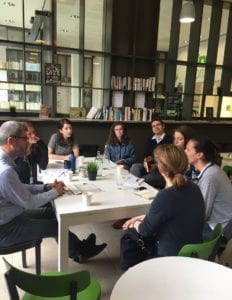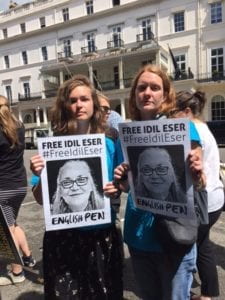Grace Larkin
English PEN
London, England
A few weeks ago, I had the incredible opportunity to sit in on a meeting with Muharrem Erbey, a prominent human rights lawyer in Turkey as well as a published writer, editor, and columnist. He was in London for a few days and had stopped to visit English PEN because we’ve worked on his case before and he knows some of my co-workers.

Muharrem previously spent three and a half years in pre-trial detention and has now been charged and sentenced to over six years in prison. He is accused of involvement with the Kurdistan Communities Union (KCK), the alleged political front of the banned Kurdistan Workers Party (PKK). However, based on the lack of evidence linking him to terrorism or the plotting of any kind of violence, PEN and other freedom of expression activists believe he has only been targeted because of his peaceful human rights work.
I decided to post this blog now because the persecution of writers, academics, and activists in Turkey becomes more alarming every day. Idil Eser, the director of Amnesty International’s Turkey office, was detained last Wednesday along with many other activists. Her detention follows that of Taner Kilic, the chairman of Amnesty in Turkey.

Turkey is the now biggest jailer of journalists, and over 100 independent newspapers and broadcasters there have been shut down. The crackdown on dissent in Turkey has seen about 50,000 people arrested and more than 140,000 suspended or dismissed from their jobs.
Muharrem told us that any enlightened person in Turkey (academic, writer, politician, activist, etc.) is charged as a terrorist if he or she says anything against the current government or encourages free speech and expression.
“People can’t breathe,” he said.
Muharrem really only wants to read and write. Ideally, he said, he might not write about politics but feels he must because of what is happening in his country. He reminded us that “geography is destiny” and joked that maybe if he was born somewhere else, he’d be writing something like Virginia Woolf did.
He said he doesn’t have the luxury to be scared about going back to Turkey because he has a responsibility for his children and country. He also made it clear that he will not stop his work. Many other journalists and intellectuals in Turkey have chosen to stop challenging the government to protect themselves, but he will not because he believes it is his right to speak freely. He emphasized that it is a human responsibility to speak up about wrongdoings against others.
“They are more than names,” he said. “They are our friends. They are more than numbers. They are people.”
Despite the future Muharrem faces, he seems to remain hopeful. Regarding going back to prison, he said that man’s solitude is the first step to freedom. He is also hugely grateful for PEN’s ongoing support and solidarity. When asked about what is most helpful from an organization like PEN when you’re in prison, he expressed that letters and postcards really do help.
He acknowledged that the work PEN does on international awareness and legal campaigns is important, but he could not overstate the value of personal communication: it is important for prisoners to know that their names are still being heard. Letters and postcards help to “show solidarity to fight individual despair and hopelessness.” Hopelessness, Muharrem said, is the hardest part about being in prison. He said true happiness in life comes from compassion and care, so again, letters help.
Muharrem said that although the situation is bleak, one must believe that change can occur, and this is crucial for any writer or activist. He was insistent that change has happened and continues to happen all over the world, if not in Turkey at the moment.
“We’re sitting here, having coffee and talking like this,” he said, “because of the people that thought like us in the past.”
It was a very humbling experience. Muharrem’s life is full of meaning, and I am grateful to have met him. I also realize how incredibly privileged I am to be doing this work, considering that so many others would not be able to type words like this without fear.
As with the Nabeel Rajab post, I’ll end this with Muharrem’s own words: letter from prison, November 15, 2012.